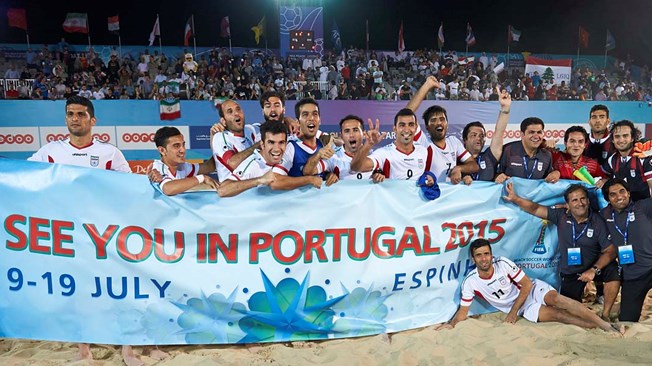The FIFA Beach Soccer World Cup Portugal 2015 begins this Thursday, which is the eighth edition of the global showpiece. Sixteen teams from around the world will play a total of 32 matches at the 3,300 capacity Estadio da Praia da Baia in Espinho.
FIFA.com marks your card for the tournament by providing the answers to five key questions.
Are Russia the team to beat?
No question. The defending champions will arrive in Espinho with ten of the 12 players who secured their second consecutive world title at Tahiti 2013, where they took their unbeaten run in the competition to 12 matches. The Russians can be expected once again to show all the hunger that has made them the best team in the world. Having just won European Games gold in Baku – despite losing one of their group matches – they will not be lacking in confidence. “I hope we’ll do no worse than in the last two World Cups,” said Russia coach Mikhail Likhachev. “Russia are among the favourites for this tournament, but we’re not the only favourites.”
Which other teams are in the running for the title?
While the list of contenders has grown in recent years, it is hard to look past four-time winners Brazil as the team next most likely to triumph after Russia. Also in the mix are three European teams possessing the blend of youth and experience needed to become world champions: Spain, the runners-up at Tahiti 2013 and the 2014 Euro Beach Soccer Cup winners; Italy, the only side to beat Russia in Baku; and Switzerland, who still have several members of the side that finished second at Dubai 2009 in their ranks. And let’s not forget tournament hosts Portugal.
Can Portugal handle the pressure of playing on home sand?
Judging by the quality of players at their disposal, the Portuguese should be able to cope with the expectation that comes with playing in front of one’s own fans. Between them, Madjer, Alan and Belchior have racked up 96 Beach Soccer World Cup matches and 140 goals, and possess the experience needed to harness pressure and turn it into something positive.
“The fans are our 11th player and there’s no doubt they’re going to give us a huge boost,” said Madjer in a recent interview with FIFA.com. “The sport’s getting more and more popular and people are sitting up and taking notice of it. All we have to do is repay that by having success on the sand.”
The fact is, however, that Brazil remain the only host nation ever to have won the world title, though it should be remembered that they failed to do so on their first attempt in 2005, when Portugal beat them in the semi-finals. Since Brazil’s last win on home sand in Rio de Janeiro in 2007, the host nations have found success hard to come by in the Beach Soccer World Cup. Both France at Marseille 2008 and Italy at Ravenna 2011 failed to progress beyond the quarter-finals, while United Arab Emirates went out in the group phase at Dubai 2009. In finishing fourth in 2013, however, Tahiti exceeded all expectations.
Are there likely to be any shocks?
Yes. Japan surprised everyone by reaching the last four in 2005, while few tipped Uruguay to reach the 2006 final and even fewer expected to see Mexico there in 2007. The fourth places achieved by El Salvador in 2009 and the Tahitians two years ago also came out of the blue. Those unlikely achievements will only fire the dreams of the sides hoping to cause an upset or two this time around.
Among them are Iran, who will be coached for a third time by Marco Octavio. Speaking recently to FIFA.com, he was bullish about their prospects in Portugal: “We have to try and win the title. We are a strong team, as we’ve shown in the past. We reached the quarter-finals at the last World Cup, where we went down fighting to world champions Russia. After the world finals we then went on to beat Russia and Brazil, and we’ll need to be ready to figure among the title contenders this time.”
Team Melli will do well to cause a splash this time, having been drawn in the toughest group of all, alongside Brazil, Spain and Mexico. Senegal, Paraguay and Costa Rica have similarly lofty ambitions. On duty at Dubai 2009, when the Costa Ricans lost their three group games, Tico striker Greivin Pacheco is confident they can fare better this time, despite being drawn in a daunting group with Italy, Switzerland and Oman. “It’s difficult but not impossible,” he told FIFA.com. “We don’t want to go over there just being happy to take part again. We need to aim to make history.”
Who will be the stars of the tournament?
Beach soccer mega-stars Madjer, Bruno Xavier and Andrey Bukhlitskiy are just some of the players who have been lighting up the game for years now and are sure to be doing so again in Espinho. Less well-known but just as consistent on the big stage are the likes of Iran’s Mohammad Ahmadzadeh, Italy’s Paolo Palmacci and the Argentinian Luciano Franceschini.
Meanwhile, Portugal 2015 will see a clutch of hotly tipped young talents step out into the global spotlight, among them Spain’s Llorenc, Datinha of Brazil, Ozu of Japan, Tahiti’s Raimana Li Fung Kuee, Babacar Fall of Senegal and the Paraguayan Ruben Moran.

